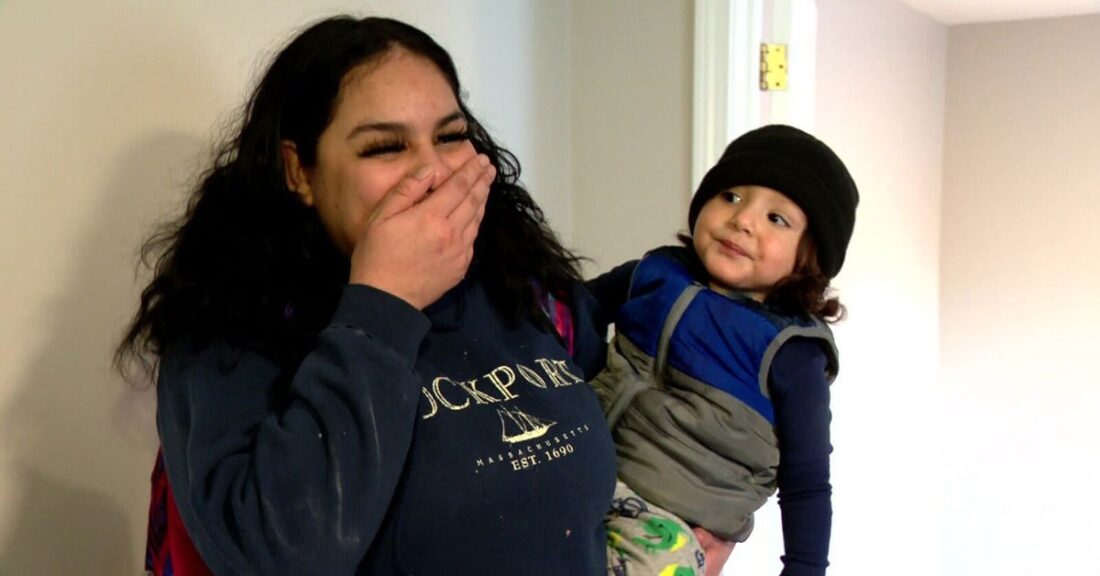Nonprofit Evolves Into an Affordable Housing Landlord for Former Foster Youth

Photo of Tatiana and child courtesy of WJAR, Providence
Tears of joy flowed at Foster Forward’s January 2022 ribbon-cutting ceremony. The Rhode Island nonprofit had spent months preparing a multifamily house that it had purchased, renovated and furnished with help from donors. And, at long last, it was ready.
The emotional milestone is the first of many for Foster Forward, a site of the Annie E. Casey Foundation’s Jim Casey Youth Opportunities Initiative® that is dedicated to helping current and former youth in foster care succeed.
Stable Housing and More
The house’s new tenants — three young women and their children — have gained more than a new address for the next three years. They’re also getting a rare fresh start in a housing market where affordable rentals are scarce.
As part of the opportunity, each young person:
- Pays only 30% of their income toward rent.
- Receives subsidized rent supported by federal and other housing vouchers.
- Gets aid through the Jim Casey Initiative’s Opportunity Passport®, a match savings program that helps young people build their financial capabilities.
- Receives help with education and employment, two areas that — in addition to housing — address basic needs that support their success to live independently.
“What Foster Forward is doing is critical because they are knitting together a strategy that promotes connection to school, work and other opportunities for young people who have experienced foster care,” says Catherine Lester, an associate director with the Casey Foundation. “It is exciting to see this housing option come online as a brick-and-mortar resource that can help with beginning to provide the stability young people need to begin to heal so that they really are able to learn, to work, and to nurture the relationships that matter most to them.”
A Familiar Challenge
The property is located in Pawtucket, where apartments can rent for anywhere between $990 to $1,200 a month, depending on the location, size and condition of the unit. This price range is dishearteningly high for hundreds of local youth who have exited foster care, are living independently and lack the support and safety net of a permanent family.
Assuming the role of landlord is a pivot for Foster Forward, which has spent years helping homeless youth search for clean, safe apartments.
An estimated 200 Rhode Island young people ages 18 to 24 are homeless, says Foster Forward Executive Director Lisa Guillette. About a third of these youth are parenting or are pregnant, according to the state’s 2018 Point-In-Time Count, which utilizes snapshots and surveys of the homeless population. Youth of color, youth who identify as LGBTQ and youth who have experienced foster care are disproportionately represented within this age group, the data indicates.
The prevailing solution to date, housing vouchers, help young people pay for shelter. But many factors — including a reluctance to rent to young tenants and a lack of safe, clean affordable options — prevent youth from using the vouchers to secure suitable apartments.
A Necessary Pivot
Upon deciding that the problem was “intractable” in the region served by Foster Forward, the organization began house hunting, according to Guillette.
“After more than a decade as a supportive services provider for young people leaving foster care, we were at an impasse helping them find safe and affordable rental options,” says Guillette. “A generous donation from a private charitable foundation and the advent of the federal Foster Youth to Independence vouchers propelled us from bystander to landlord.”
But the shift to landlord — and the task of transforming a fixer-upper — was far from seamless. Foster Forward encountered local zoning restrictions that prohibited it from creating a fourth unit in the house. The property also lacked sufficient parking to support another unit, and a request for a variance was denied.
Today, Guillette remains undeterred. “While hardly inexpensive or easy to execute, this highly targeted small test of change creatively leverages and braids funding in sustainable ways that will ultimately springboard our efforts to replicate and scale,” she says.
The scale she’s envisioning is significant: Guillette has set a long-term goal for Foster Forward to establish more than 100 homes just like its Pawtucket house. Realizing this vision would help young people throughout the state access affordable housing — and get a much-needed jumpstart on their path to success.






